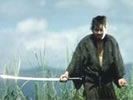Eye For Film >> Movies >> Zatoichi The Fugitive (1963) Film Review
This is the fourth in the Zatoichi franchise, which spawned more sequels than Godzilla in Japan, the latest being Takeshi Kitano's 2003 version, which was a critical and popular success.
The protagonist is a blind swordsman, with no superhuman powers. He is on the run for crimes that are never explained; or rather he is on the walk, since running, especially in a forest, is not clever when you can't see a thing.

While resting beside a river and having a bite to eat, he is attacked by a stranger. There is 10 pyo (Japanese for peanuts) on his head and this lowlife opportunist wants to cash in on the reward. After a brief tussle, Zatoichi disembowels the unfortunate young man with a single stroke of his magnificent blade (in 1963, lurid details, such as guts in a bucket, are left to the imagination). Before he dies, the mortally disappointed would-be-murderer tells Zatoichi where to find his mother and Zatoichi, being a honourable man, sets off in search of her.
Unlike the later films in the franchise, The Fugitive is not a kung fu fighting extravaganza. Except for the final showdown with a Samurai assassin and the inevitable slashfest against half the village, it is as much about local politics and family ructions as showing off Zatoichi's swordsmanship.
He finds the dead man's mother, confesses to her, attends the funeral, stays at the inn and becomes involved with what is going on, especially in the life of the innkeeper's adopted daughter who wants to marry a landowner, who lacks the courage to follow his heart.
Besides these romantic upsets, there are territorial disputes, serious enough to hire a hitman in the form of the samurai, who has shacked up with Zatoichi's old girlfriend, much to her embarrassment and shame ("Once you stop trusting men, you are like a kite with a broken wing, blowing in the wind from one man to another").
Shintaro Katsu is perfectly cast, as Zatoichi, being in every sense, except one, ordinary. This makes his dexterity with the sword, which he holds downwards, like a dagger, while crouching to hear better, even more impressive and (almost) believable. He may not have the humour of Kitano, but he has the conviction of a true hero.
Reviewed on: 08 Nov 2006



















